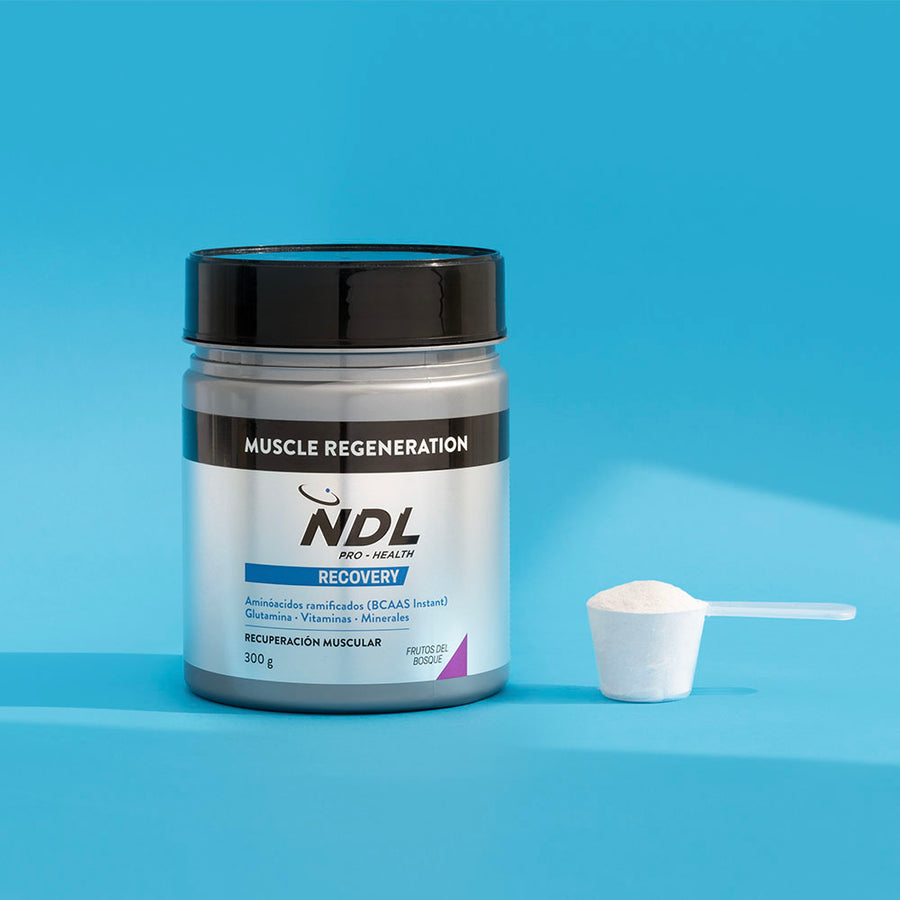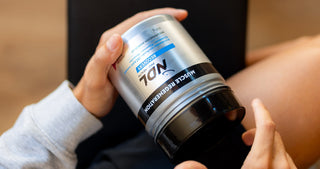Featured Products

Muscle Regeneration
See productFor a long time, glutamine has been primarily known in the fitness world as a supplement to enhance muscle recovery. However, this amino acid goes far beyond the sports realm.
Glutamine plays a key role in numerous vital bodily functions: it supports immune system balance, contributes to gut health, and plays a fundamental role during times of physical or metabolic stress. That’s why more and more studies are highlighting the benefits of glutamine for people who don't necessarily play sports but want to support their digestive health or strengthen their immune defenses.
In this article, we’ll take a closer look at the science-backed benefits of glutamine, so you can decide whether including it in your daily routine can make a difference—for performance, health, or overall wellbeing.
A natural ally for your body
Glutamine is the most abundant amino acid in the human body. It is naturally produced in the muscles, lungs, and other organs, and plays essential roles in metabolism and cell regeneration.
Although classified as a "non-essential" amino acid—meaning the body can produce it on its own—it can become “conditionally essential” in certain situations. This happens when the body’s needs exceed its production capacity, such as during intense training, prolonged stress, infections, or illness.
In addition, glutamine is obtained through food, mainly from protein-rich sources such as meat, fish, eggs, dairy, legumes, or nuts. However, in times of high demand or restrictive diets, levels can be reduced.
Science-backed benefits
Widely studied for its positive impact on different areas of health, here are the main benefits of glutamine:
- Immune system support during key moments: Glutamine is an essential energy source for immune cells such as lymphocytes and macrophages. During periods of physical stress (like intense workouts) or illness, the immune system demands more glutamine than the body can produce. Proper supplementation can help keep defenses active and reduce the risk of infections—especially for athletes or immunocompromised individuals.
- Muscle and energy recovery: One of the best-known uses of glutamine is its ability to support post-exercise recovery. It helps replenish glycogen stores, promotes protein synthesis, and may reduce muscle breakdown (catabolism), especially after intense training sessions. It has also been associated with reduced perception of post-exercise muscle soreness.
- Healthy gut, balanced body: In clinical settings, glutamine is also used for patients undergoing surgery, severe burns, cancer treatments, or chronic illness to support recovery and preserve muscle mass. While its clinical use requires medical supervision, it demonstrates its versatility as a functional nutrient.

So, glutamine is not just a useful supplement for athletes—it’s a key nutrient with multiple science-backed benefits.
Do I need to supplement it?
Under normal conditions, the body is able to produce the glutamine it needs. However, there are situations where demand increases and endogenous production isn’t enough.
In such cases, supplementation can be beneficial to avoid deficiencies, promote cellular regeneration, and keep key functions like immunity and gut health in balance.
It may also be useful for people with low protein intake (strict vegan diets, appetite loss, etc.) or those going through periods of intense physical or mental strain.
Nonetheless, like any supplement, its use should have a clear purpose and be tailored to individual needs.
How to include it in your routine
Glutamine usually comes in powder or capsule form, making it easy to incorporate into any daily routine. When taking it, consider your personal goal:
- For muscle recovery: The recommended dose is between 5 and 10 grams per day, preferably after training or before bed. It helps accelerate muscle repair and reduce post-exercise soreness.
- For digestive or immune support: It can be taken on an empty stomach or divided into multiple doses throughout the day, depending on specialist advice. In these cases, its main role is to strengthen the intestinal barrier and immune system.
- In combination with other supplements: Glutamine is compatible with other products such as protein powders, BCAAs, or creatine. It does not interfere with their absorption, making it easy to mix into shakes or pre/post-workout routines.
Common myths about glutamine
Despite its popularity, several myths surround glutamine that can cause confusion. Here we debunk some of the most common:
- Glutamine is only for bodybuilders: While it's popular in sports nutrition, its benefits go far beyond that. People with digestive issues, chronic stress, or weakened immune systems may also benefit from its use.
- It makes you gain weight: Glutamine doesn't provide significant calories nor does it directly stimulate appetite. Its role is not to provide energy, but to support regeneration and cellular repair.
- You don’t need it if you eat well: A balanced diet is crucial, but during periods of high physiological demand (e.g., intense training, illness, recovery), even a good diet may not be enough to maintain optimal levels.
- Everyone should take it: It's not an essential supplement for everyone. Its use should be assessed on a case-by-case basis, depending on lifestyle, diet, and individual needs.
In conclusion, glutamine is much more than a sports supplement. Its role in gut health, immune support, and physical recovery makes it a valuable nutrient for different stages and profiles.
Whether you train intensely, are going through a stressful period, or simply want to support your inner wellbeing, glutamine can be a useful ally when used wisely. As always, the key is to listen to your body and, if needed, consult a professional to incorporate it safely and effectively into your routine.

From the NDL Pro-Health team we will provide you with tips to maintain a healthy lifestyle. Sharing knowledge and product recommendations to offer optimal solutions for your daily routine, for your workouts and subsequent recovery, all with the goal of helping you achieve physical and mental wellness.

















